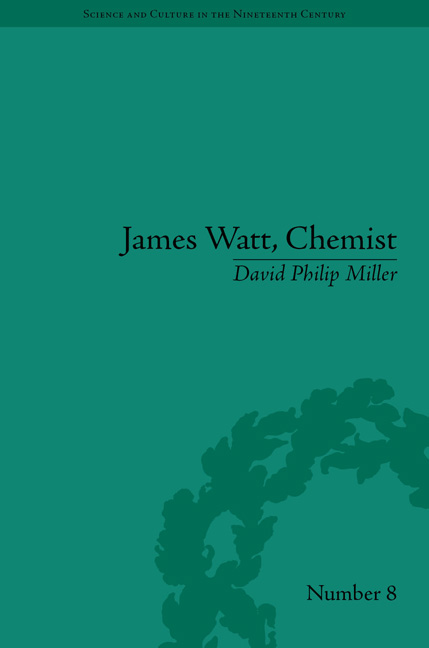Book contents
- Frontmatter
- CONTENTS
- Dedication
- Acknowledgements
- List of Figures
- Miscellaneous Frontmatter
- Introduction
- I Representations
- 1 Of Statues, Kettles and Indicators – The ‘Mechanical Watt’
- 2 The Demise of the ‘Chemical Watt’ in the Nineteenth Century
- 3 The ‘Mechanical Watt’: The Making of a ‘Philosophical Engineer’
- II Realities
- Notes
- Works Cited
- Index
3 - The ‘Mechanical Watt’: The Making of a ‘Philosophical Engineer’
from I - Representations
- Frontmatter
- CONTENTS
- Dedication
- Acknowledgements
- List of Figures
- Miscellaneous Frontmatter
- Introduction
- I Representations
- 1 Of Statues, Kettles and Indicators – The ‘Mechanical Watt’
- 2 The Demise of the ‘Chemical Watt’ in the Nineteenth Century
- 3 The ‘Mechanical Watt’: The Making of a ‘Philosophical Engineer’
- II Realities
- Notes
- Works Cited
- Index
Summary
The chemists of the nineteenth century did not embrace Watt as one of their number, but the case was very different with its engineers. In fact not only did the engineers ‘pull’ Watt into their company but the chemists, and other elite scientists, as we saw, ‘pushed’ him in that direction. Watt was, according to the likes of James David Forbes, an indifferent chemist but a ‘profound’ engineer. He was characterized as a ‘philosophical engineer’ because of his understanding, command and use of physical law.
My argument in this chapter is that Watt was made into an ‘engineer’ in the nineteenth century – perhaps it would be better to say ‘engineers’ since he was constructed as multiple manifestations of the type during that period. The implication of this process of construction is that Watt was not an engineer in the late eighteenth century, during his own lifetime. To divest Watt of the status of engineer may seem perverse and I do not mean this literally. His contemporaries often referred to Watt, and he designated himself, as an engineer. Indeed, ‘James Watt, Engineer’ was the extended identifier that he used in his published papers in the Philosophical Transactions of the Royal Society of London. His collaborative publication on pneumatic medicine with Thomas Beddoes used the same phrase on the title page. But it is only apparently perverse to problematize this self-identification because the term ‘engineer’ underwent a remarkable evolution from the mid-eighteenth century to the end of the nineteenth. In understanding Watt's self-designation as ‘engineer’ we need to understand, I suggest, what that term meant in his own time. Having done that we can then comprehend something of the way that Watt habitually presented himself to the world, and how he sought to negotiate the ambiguous status that ‘engineer’ then brought with it. For Watt was no ordinary engineer, and he and his friends wanted to make that clear.
- Type
- Chapter
- Information
- James Watt, ChemistUnderstanding the Origins of the Steam Age, pp. 59 - 84Publisher: Pickering & ChattoFirst published in: 2014



